International Business Module: Authentic Leadership in Organizations
VerifiedAdded on 2020/04/21
|12
|3183
|30
Essay
AI Summary
This essay delves into the concept of authentic leadership within the context of international business, defining it as an approach that emphasizes building genuine relationships and valuing stakeholder input. It analyzes the advantages of this leadership style, such as fostering trust and ethical behavior, and contrasts these with its disadvantages, including the lack of a unified theory and potential conflicts between stakeholder interests. The essay further explores why authentic leadership is preferred over other theories, highlighting its focus on individual development and emotional intelligence. It concludes by emphasizing the role of authentic leadership as a crucial component of leadership development, offering insights into its practical application and potential for improving organizational outcomes. The document is contributed by a student to be published on the website Desklib, a platform which provides all the necessary AI based study tools for students.
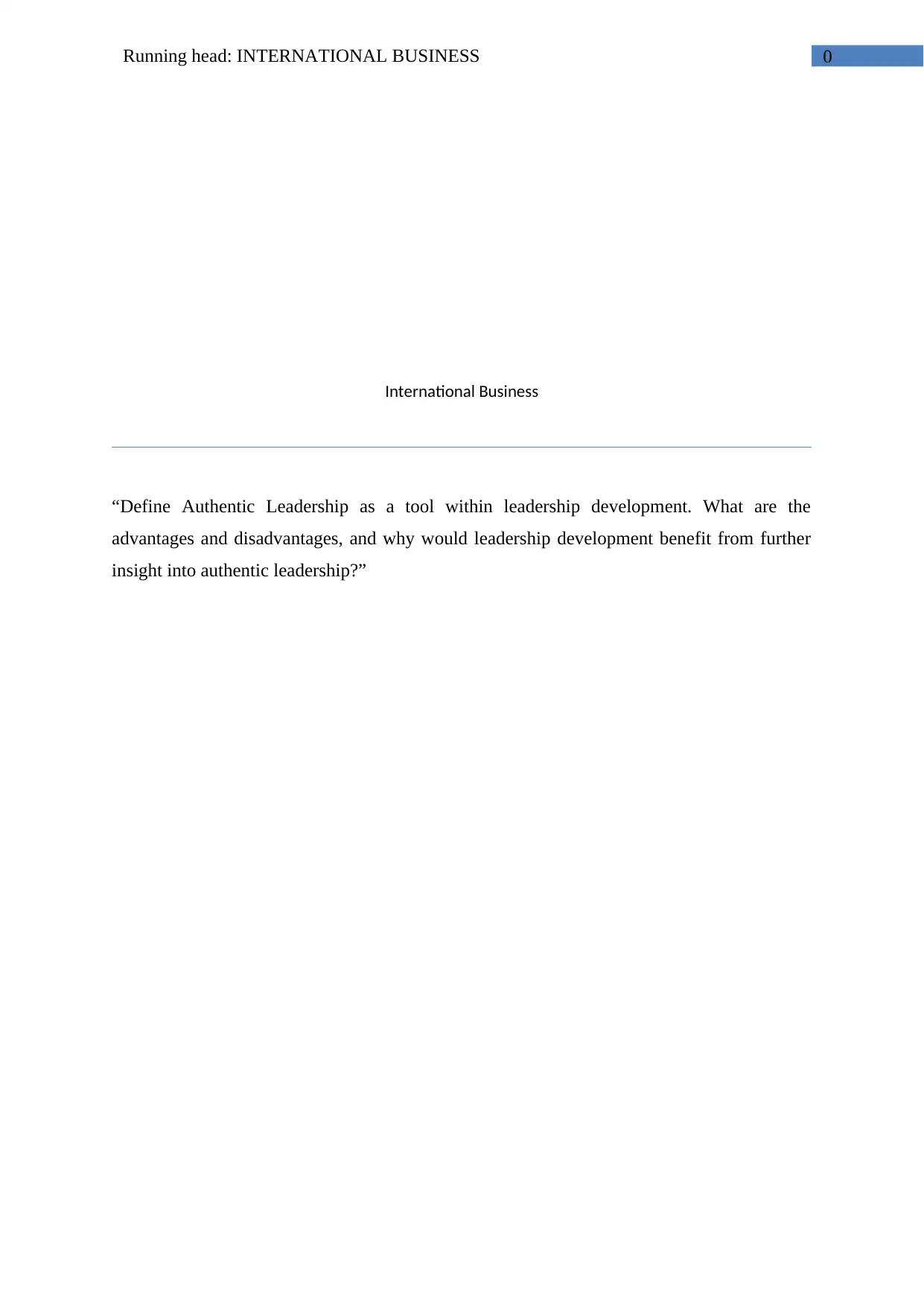
0Running head: INTERNATIONAL BUSINESS
International Business
“Define Authentic Leadership as a tool within leadership development. What are the
advantages and disadvantages, and why would leadership development benefit from further
insight into authentic leadership?”
International Business
“Define Authentic Leadership as a tool within leadership development. What are the
advantages and disadvantages, and why would leadership development benefit from further
insight into authentic leadership?”
Paraphrase This Document
Need a fresh take? Get an instant paraphrase of this document with our AI Paraphraser
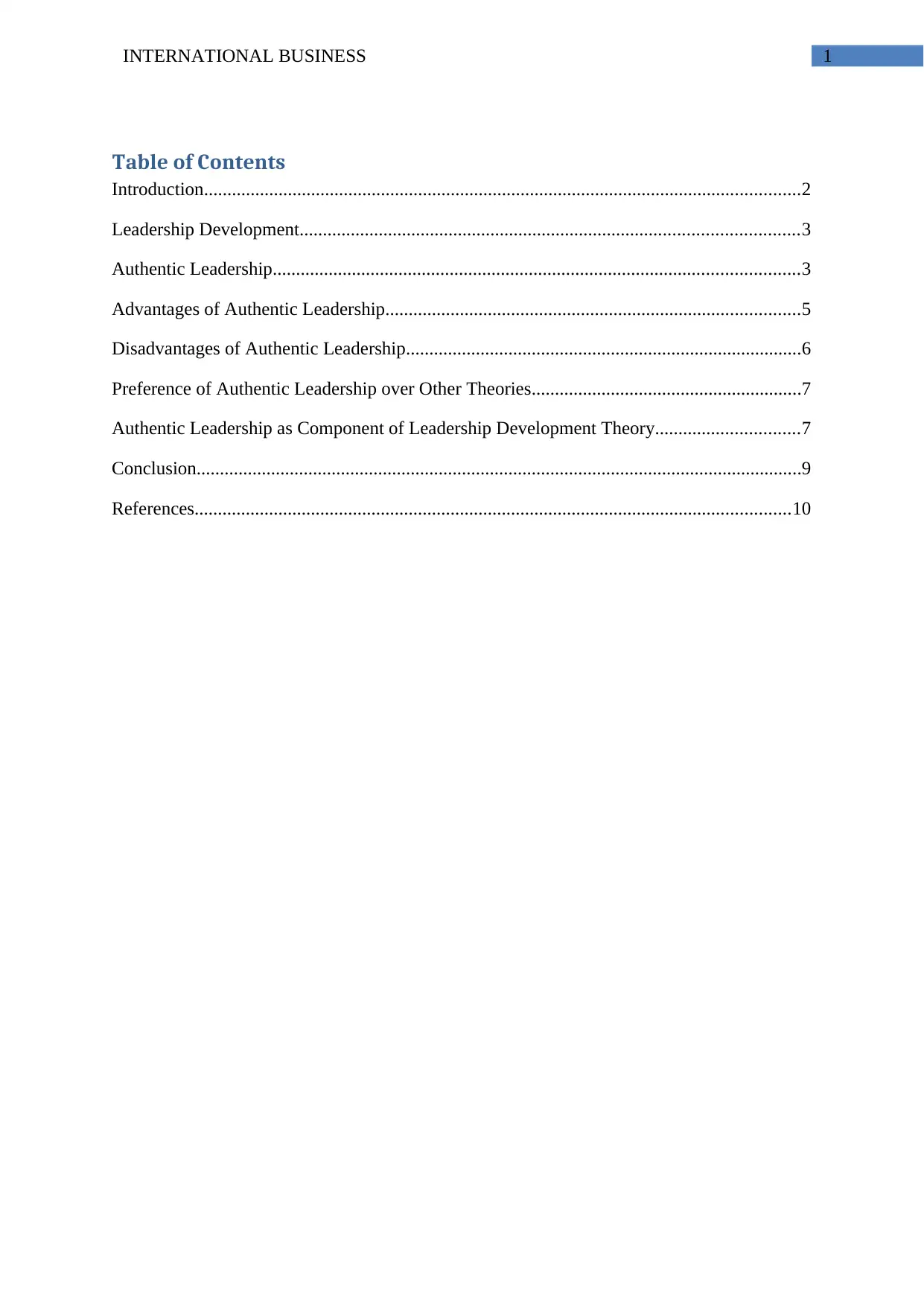
1INTERNATIONAL BUSINESS
Table of Contents
Introduction................................................................................................................................2
Leadership Development...........................................................................................................3
Authentic Leadership.................................................................................................................3
Advantages of Authentic Leadership.........................................................................................5
Disadvantages of Authentic Leadership.....................................................................................6
Preference of Authentic Leadership over Other Theories..........................................................7
Authentic Leadership as Component of Leadership Development Theory...............................7
Conclusion..................................................................................................................................9
References................................................................................................................................10
Table of Contents
Introduction................................................................................................................................2
Leadership Development...........................................................................................................3
Authentic Leadership.................................................................................................................3
Advantages of Authentic Leadership.........................................................................................5
Disadvantages of Authentic Leadership.....................................................................................6
Preference of Authentic Leadership over Other Theories..........................................................7
Authentic Leadership as Component of Leadership Development Theory...............................7
Conclusion..................................................................................................................................9
References................................................................................................................................10
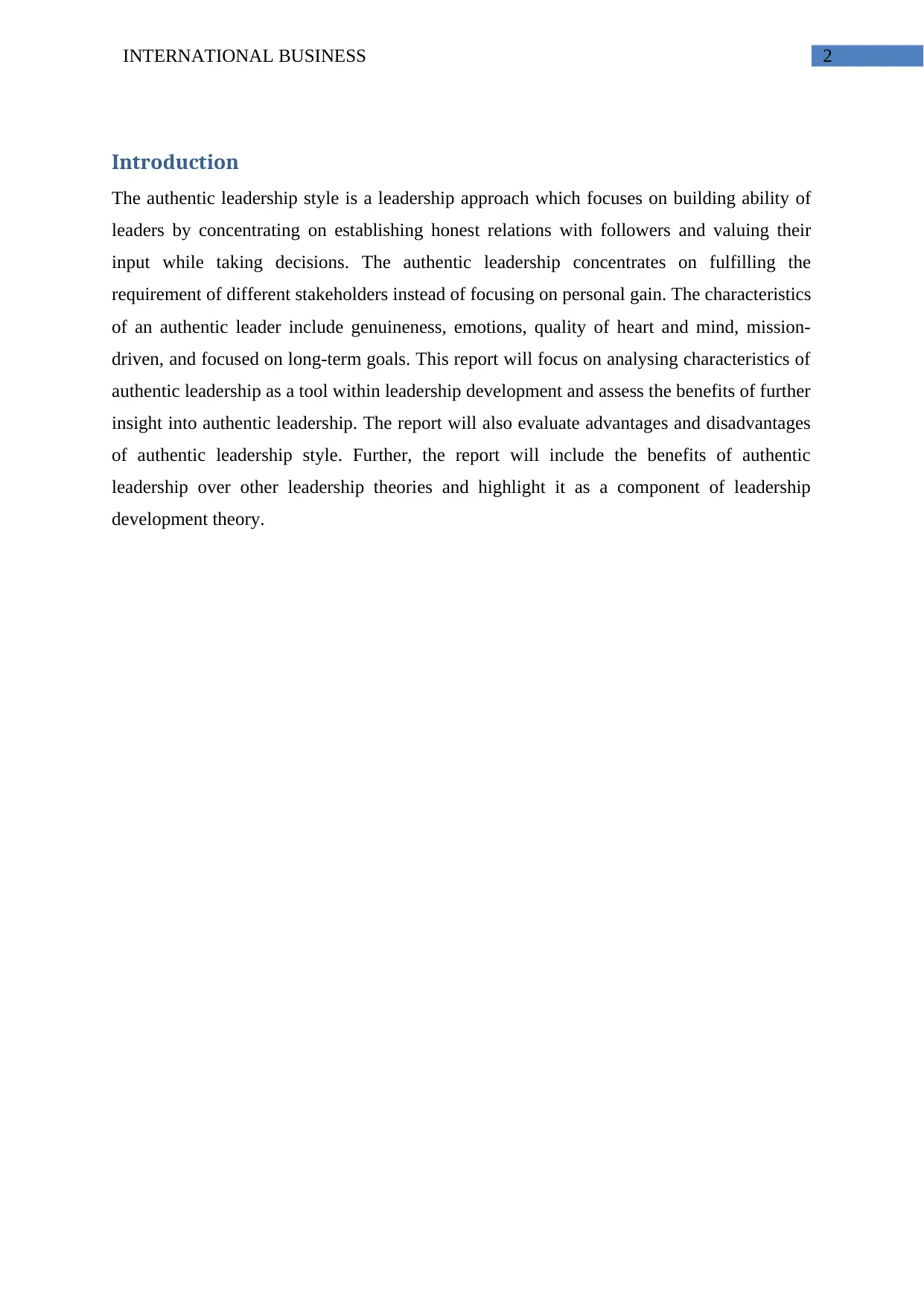
2INTERNATIONAL BUSINESS
Introduction
The authentic leadership style is a leadership approach which focuses on building ability of
leaders by concentrating on establishing honest relations with followers and valuing their
input while taking decisions. The authentic leadership concentrates on fulfilling the
requirement of different stakeholders instead of focusing on personal gain. The characteristics
of an authentic leader include genuineness, emotions, quality of heart and mind, mission-
driven, and focused on long-term goals. This report will focus on analysing characteristics of
authentic leadership as a tool within leadership development and assess the benefits of further
insight into authentic leadership. The report will also evaluate advantages and disadvantages
of authentic leadership style. Further, the report will include the benefits of authentic
leadership over other leadership theories and highlight it as a component of leadership
development theory.
Introduction
The authentic leadership style is a leadership approach which focuses on building ability of
leaders by concentrating on establishing honest relations with followers and valuing their
input while taking decisions. The authentic leadership concentrates on fulfilling the
requirement of different stakeholders instead of focusing on personal gain. The characteristics
of an authentic leader include genuineness, emotions, quality of heart and mind, mission-
driven, and focused on long-term goals. This report will focus on analysing characteristics of
authentic leadership as a tool within leadership development and assess the benefits of further
insight into authentic leadership. The report will also evaluate advantages and disadvantages
of authentic leadership style. Further, the report will include the benefits of authentic
leadership over other leadership theories and highlight it as a component of leadership
development theory.
⊘ This is a preview!⊘
Do you want full access?
Subscribe today to unlock all pages.

Trusted by 1+ million students worldwide
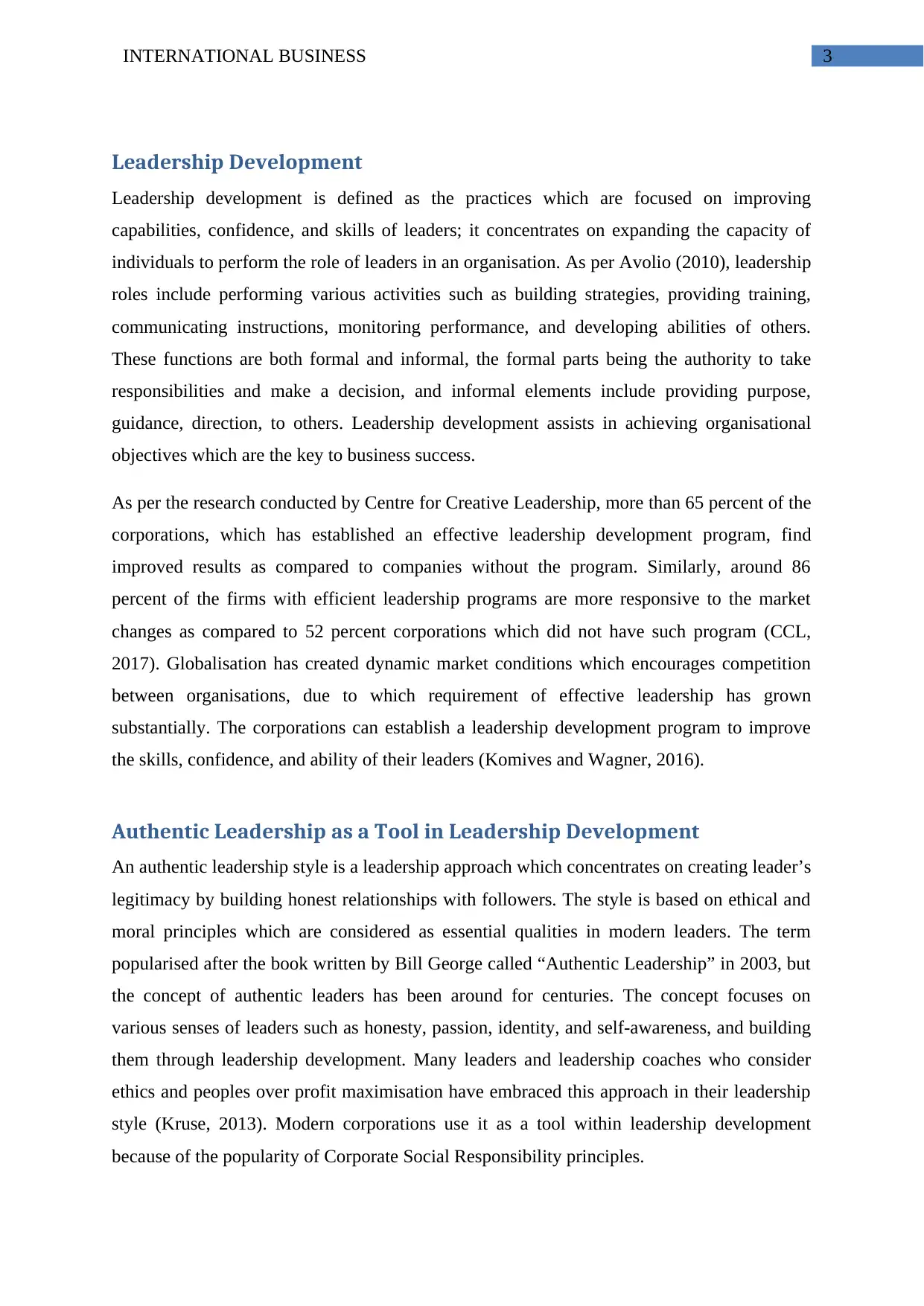
3INTERNATIONAL BUSINESS
Leadership Development
Leadership development is defined as the practices which are focused on improving
capabilities, confidence, and skills of leaders; it concentrates on expanding the capacity of
individuals to perform the role of leaders in an organisation. As per Avolio (2010), leadership
roles include performing various activities such as building strategies, providing training,
communicating instructions, monitoring performance, and developing abilities of others.
These functions are both formal and informal, the formal parts being the authority to take
responsibilities and make a decision, and informal elements include providing purpose,
guidance, direction, to others. Leadership development assists in achieving organisational
objectives which are the key to business success.
As per the research conducted by Centre for Creative Leadership, more than 65 percent of the
corporations, which has established an effective leadership development program, find
improved results as compared to companies without the program. Similarly, around 86
percent of the firms with efficient leadership programs are more responsive to the market
changes as compared to 52 percent corporations which did not have such program (CCL,
2017). Globalisation has created dynamic market conditions which encourages competition
between organisations, due to which requirement of effective leadership has grown
substantially. The corporations can establish a leadership development program to improve
the skills, confidence, and ability of their leaders (Komives and Wagner, 2016).
Authentic Leadership as a Tool in Leadership Development
An authentic leadership style is a leadership approach which concentrates on creating leader’s
legitimacy by building honest relationships with followers. The style is based on ethical and
moral principles which are considered as essential qualities in modern leaders. The term
popularised after the book written by Bill George called “Authentic Leadership” in 2003, but
the concept of authentic leaders has been around for centuries. The concept focuses on
various senses of leaders such as honesty, passion, identity, and self-awareness, and building
them through leadership development. Many leaders and leadership coaches who consider
ethics and peoples over profit maximisation have embraced this approach in their leadership
style (Kruse, 2013). Modern corporations use it as a tool within leadership development
because of the popularity of Corporate Social Responsibility principles.
Leadership Development
Leadership development is defined as the practices which are focused on improving
capabilities, confidence, and skills of leaders; it concentrates on expanding the capacity of
individuals to perform the role of leaders in an organisation. As per Avolio (2010), leadership
roles include performing various activities such as building strategies, providing training,
communicating instructions, monitoring performance, and developing abilities of others.
These functions are both formal and informal, the formal parts being the authority to take
responsibilities and make a decision, and informal elements include providing purpose,
guidance, direction, to others. Leadership development assists in achieving organisational
objectives which are the key to business success.
As per the research conducted by Centre for Creative Leadership, more than 65 percent of the
corporations, which has established an effective leadership development program, find
improved results as compared to companies without the program. Similarly, around 86
percent of the firms with efficient leadership programs are more responsive to the market
changes as compared to 52 percent corporations which did not have such program (CCL,
2017). Globalisation has created dynamic market conditions which encourages competition
between organisations, due to which requirement of effective leadership has grown
substantially. The corporations can establish a leadership development program to improve
the skills, confidence, and ability of their leaders (Komives and Wagner, 2016).
Authentic Leadership as a Tool in Leadership Development
An authentic leadership style is a leadership approach which concentrates on creating leader’s
legitimacy by building honest relationships with followers. The style is based on ethical and
moral principles which are considered as essential qualities in modern leaders. The term
popularised after the book written by Bill George called “Authentic Leadership” in 2003, but
the concept of authentic leaders has been around for centuries. The concept focuses on
various senses of leaders such as honesty, passion, identity, and self-awareness, and building
them through leadership development. Many leaders and leadership coaches who consider
ethics and peoples over profit maximisation have embraced this approach in their leadership
style (Kruse, 2013). Modern corporations use it as a tool within leadership development
because of the popularity of Corporate Social Responsibility principles.
Paraphrase This Document
Need a fresh take? Get an instant paraphrase of this document with our AI Paraphraser
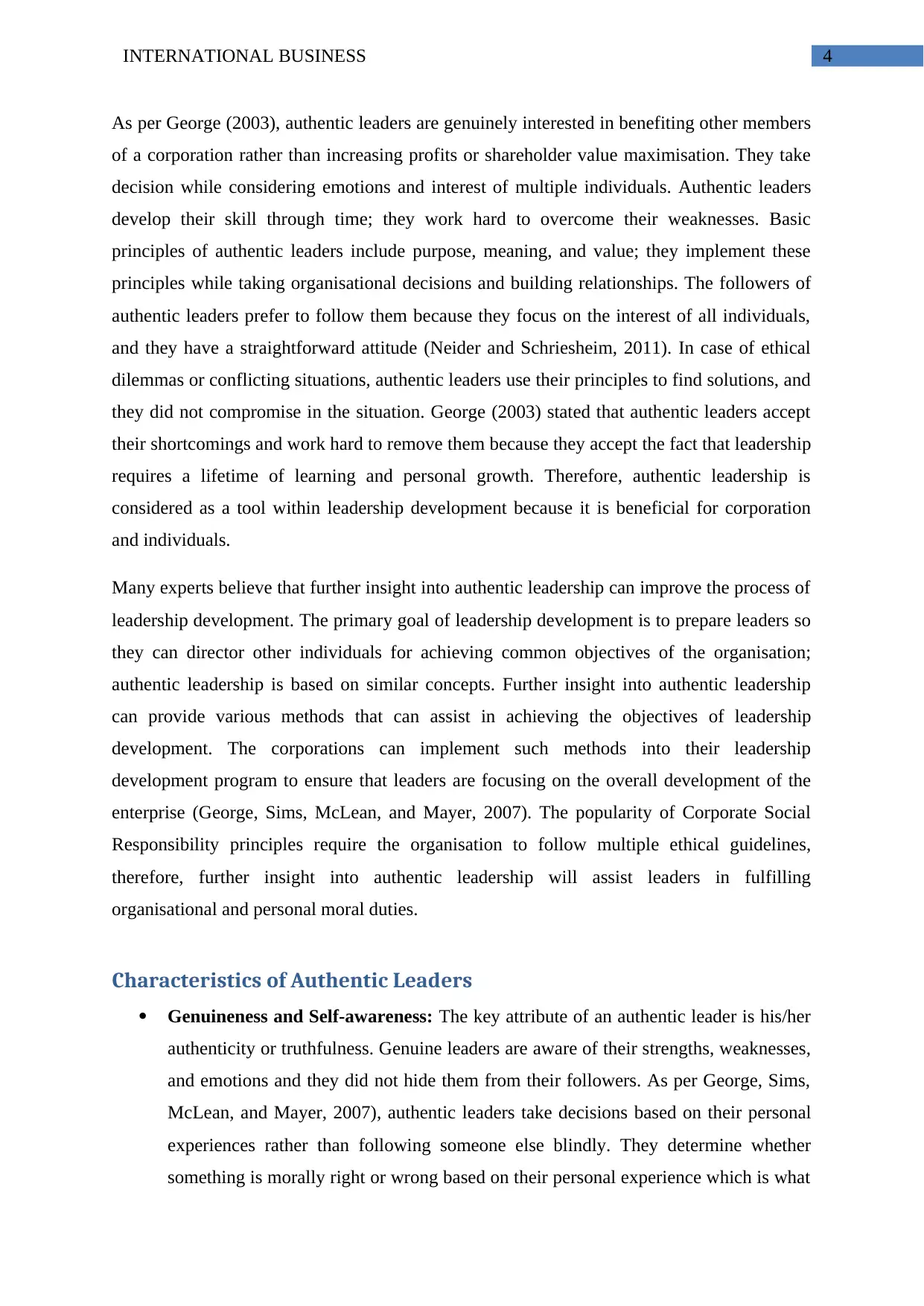
4INTERNATIONAL BUSINESS
As per George (2003), authentic leaders are genuinely interested in benefiting other members
of a corporation rather than increasing profits or shareholder value maximisation. They take
decision while considering emotions and interest of multiple individuals. Authentic leaders
develop their skill through time; they work hard to overcome their weaknesses. Basic
principles of authentic leaders include purpose, meaning, and value; they implement these
principles while taking organisational decisions and building relationships. The followers of
authentic leaders prefer to follow them because they focus on the interest of all individuals,
and they have a straightforward attitude (Neider and Schriesheim, 2011). In case of ethical
dilemmas or conflicting situations, authentic leaders use their principles to find solutions, and
they did not compromise in the situation. George (2003) stated that authentic leaders accept
their shortcomings and work hard to remove them because they accept the fact that leadership
requires a lifetime of learning and personal growth. Therefore, authentic leadership is
considered as a tool within leadership development because it is beneficial for corporation
and individuals.
Many experts believe that further insight into authentic leadership can improve the process of
leadership development. The primary goal of leadership development is to prepare leaders so
they can director other individuals for achieving common objectives of the organisation;
authentic leadership is based on similar concepts. Further insight into authentic leadership
can provide various methods that can assist in achieving the objectives of leadership
development. The corporations can implement such methods into their leadership
development program to ensure that leaders are focusing on the overall development of the
enterprise (George, Sims, McLean, and Mayer, 2007). The popularity of Corporate Social
Responsibility principles require the organisation to follow multiple ethical guidelines,
therefore, further insight into authentic leadership will assist leaders in fulfilling
organisational and personal moral duties.
Characteristics of Authentic Leaders
Genuineness and Self-awareness: The key attribute of an authentic leader is his/her
authenticity or truthfulness. Genuine leaders are aware of their strengths, weaknesses,
and emotions and they did not hide them from their followers. As per George, Sims,
McLean, and Mayer, 2007), authentic leaders take decisions based on their personal
experiences rather than following someone else blindly. They determine whether
something is morally right or wrong based on their personal experience which is what
As per George (2003), authentic leaders are genuinely interested in benefiting other members
of a corporation rather than increasing profits or shareholder value maximisation. They take
decision while considering emotions and interest of multiple individuals. Authentic leaders
develop their skill through time; they work hard to overcome their weaknesses. Basic
principles of authentic leaders include purpose, meaning, and value; they implement these
principles while taking organisational decisions and building relationships. The followers of
authentic leaders prefer to follow them because they focus on the interest of all individuals,
and they have a straightforward attitude (Neider and Schriesheim, 2011). In case of ethical
dilemmas or conflicting situations, authentic leaders use their principles to find solutions, and
they did not compromise in the situation. George (2003) stated that authentic leaders accept
their shortcomings and work hard to remove them because they accept the fact that leadership
requires a lifetime of learning and personal growth. Therefore, authentic leadership is
considered as a tool within leadership development because it is beneficial for corporation
and individuals.
Many experts believe that further insight into authentic leadership can improve the process of
leadership development. The primary goal of leadership development is to prepare leaders so
they can director other individuals for achieving common objectives of the organisation;
authentic leadership is based on similar concepts. Further insight into authentic leadership
can provide various methods that can assist in achieving the objectives of leadership
development. The corporations can implement such methods into their leadership
development program to ensure that leaders are focusing on the overall development of the
enterprise (George, Sims, McLean, and Mayer, 2007). The popularity of Corporate Social
Responsibility principles require the organisation to follow multiple ethical guidelines,
therefore, further insight into authentic leadership will assist leaders in fulfilling
organisational and personal moral duties.
Characteristics of Authentic Leaders
Genuineness and Self-awareness: The key attribute of an authentic leader is his/her
authenticity or truthfulness. Genuine leaders are aware of their strengths, weaknesses,
and emotions and they did not hide them from their followers. As per George, Sims,
McLean, and Mayer, 2007), authentic leaders take decisions based on their personal
experiences rather than following someone else blindly. They determine whether
something is morally right or wrong based on their personal experience which is what
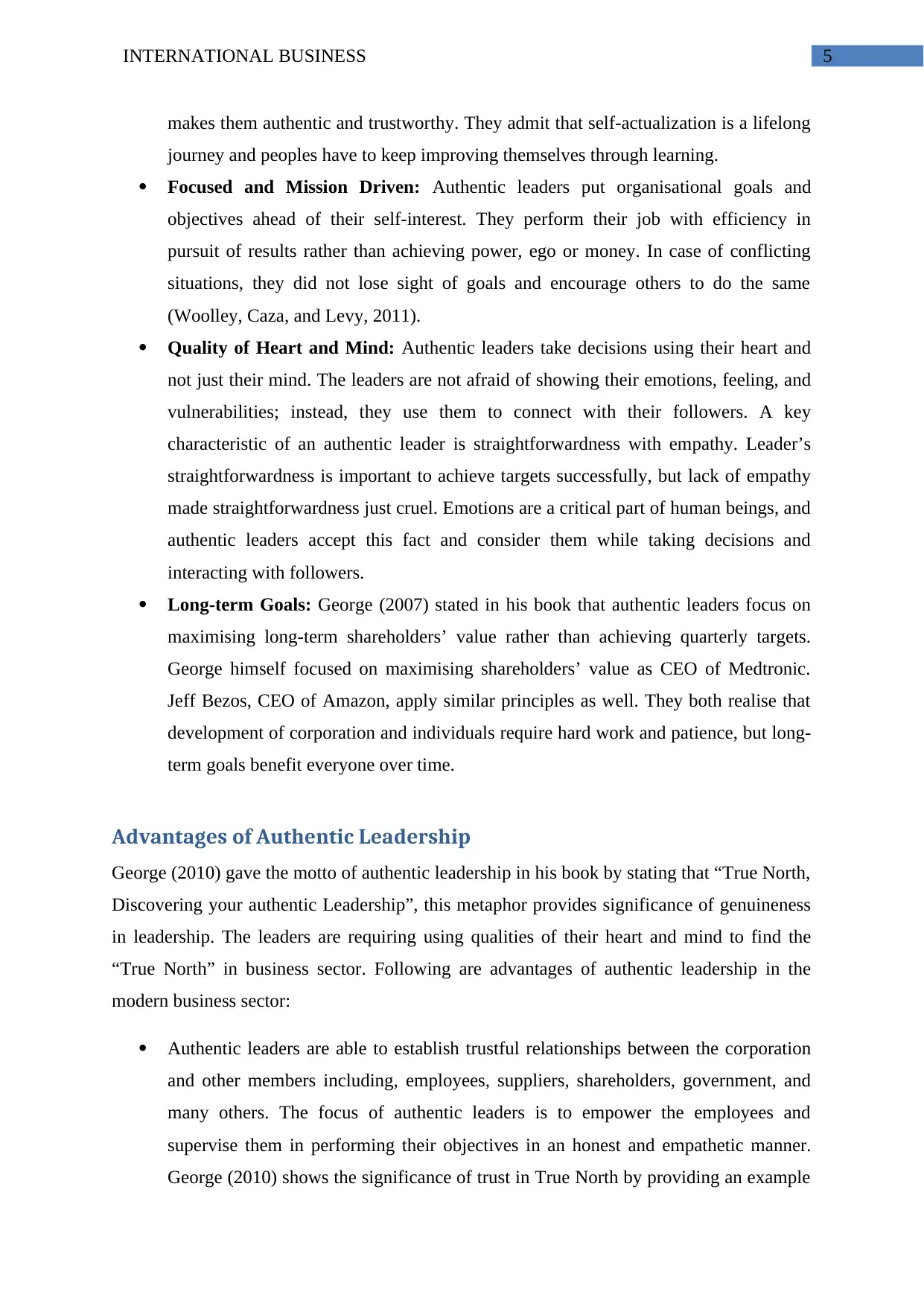
5INTERNATIONAL BUSINESS
makes them authentic and trustworthy. They admit that self-actualization is a lifelong
journey and peoples have to keep improving themselves through learning.
Focused and Mission Driven: Authentic leaders put organisational goals and
objectives ahead of their self-interest. They perform their job with efficiency in
pursuit of results rather than achieving power, ego or money. In case of conflicting
situations, they did not lose sight of goals and encourage others to do the same
(Woolley, Caza, and Levy, 2011).
Quality of Heart and Mind: Authentic leaders take decisions using their heart and
not just their mind. The leaders are not afraid of showing their emotions, feeling, and
vulnerabilities; instead, they use them to connect with their followers. A key
characteristic of an authentic leader is straightforwardness with empathy. Leader’s
straightforwardness is important to achieve targets successfully, but lack of empathy
made straightforwardness just cruel. Emotions are a critical part of human beings, and
authentic leaders accept this fact and consider them while taking decisions and
interacting with followers.
Long-term Goals: George (2007) stated in his book that authentic leaders focus on
maximising long-term shareholders’ value rather than achieving quarterly targets.
George himself focused on maximising shareholders’ value as CEO of Medtronic.
Jeff Bezos, CEO of Amazon, apply similar principles as well. They both realise that
development of corporation and individuals require hard work and patience, but long-
term goals benefit everyone over time.
Advantages of Authentic Leadership
George (2010) gave the motto of authentic leadership in his book by stating that “True North,
Discovering your authentic Leadership”, this metaphor provides significance of genuineness
in leadership. The leaders are requiring using qualities of their heart and mind to find the
“True North” in business sector. Following are advantages of authentic leadership in the
modern business sector:
Authentic leaders are able to establish trustful relationships between the corporation
and other members including, employees, suppliers, shareholders, government, and
many others. The focus of authentic leaders is to empower the employees and
supervise them in performing their objectives in an honest and empathetic manner.
George (2010) shows the significance of trust in True North by providing an example
makes them authentic and trustworthy. They admit that self-actualization is a lifelong
journey and peoples have to keep improving themselves through learning.
Focused and Mission Driven: Authentic leaders put organisational goals and
objectives ahead of their self-interest. They perform their job with efficiency in
pursuit of results rather than achieving power, ego or money. In case of conflicting
situations, they did not lose sight of goals and encourage others to do the same
(Woolley, Caza, and Levy, 2011).
Quality of Heart and Mind: Authentic leaders take decisions using their heart and
not just their mind. The leaders are not afraid of showing their emotions, feeling, and
vulnerabilities; instead, they use them to connect with their followers. A key
characteristic of an authentic leader is straightforwardness with empathy. Leader’s
straightforwardness is important to achieve targets successfully, but lack of empathy
made straightforwardness just cruel. Emotions are a critical part of human beings, and
authentic leaders accept this fact and consider them while taking decisions and
interacting with followers.
Long-term Goals: George (2007) stated in his book that authentic leaders focus on
maximising long-term shareholders’ value rather than achieving quarterly targets.
George himself focused on maximising shareholders’ value as CEO of Medtronic.
Jeff Bezos, CEO of Amazon, apply similar principles as well. They both realise that
development of corporation and individuals require hard work and patience, but long-
term goals benefit everyone over time.
Advantages of Authentic Leadership
George (2010) gave the motto of authentic leadership in his book by stating that “True North,
Discovering your authentic Leadership”, this metaphor provides significance of genuineness
in leadership. The leaders are requiring using qualities of their heart and mind to find the
“True North” in business sector. Following are advantages of authentic leadership in the
modern business sector:
Authentic leaders are able to establish trustful relationships between the corporation
and other members including, employees, suppliers, shareholders, government, and
many others. The focus of authentic leaders is to empower the employees and
supervise them in performing their objectives in an honest and empathetic manner.
George (2010) shows the significance of trust in True North by providing an example
⊘ This is a preview!⊘
Do you want full access?
Subscribe today to unlock all pages.

Trusted by 1+ million students worldwide
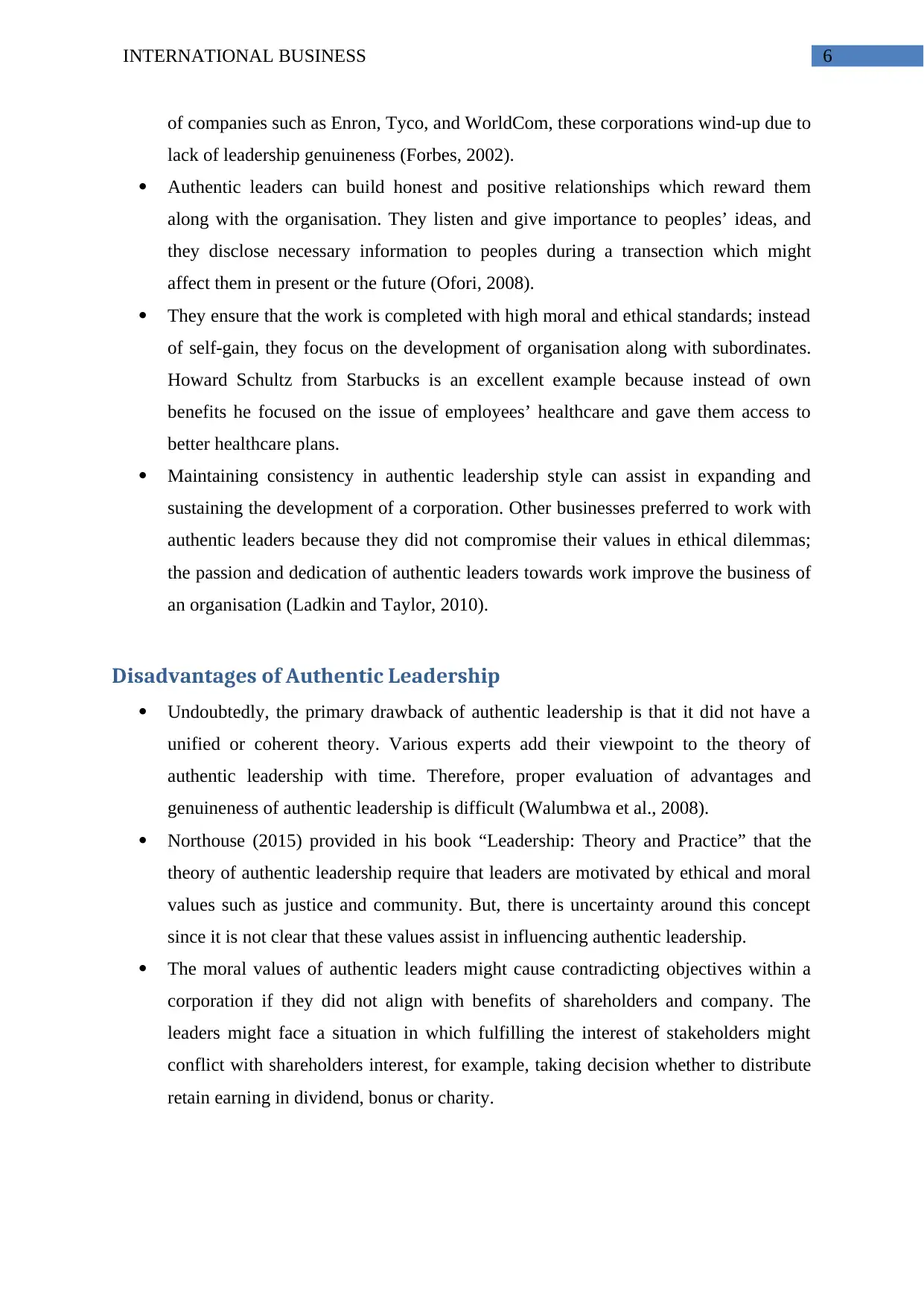
6INTERNATIONAL BUSINESS
of companies such as Enron, Tyco, and WorldCom, these corporations wind-up due to
lack of leadership genuineness (Forbes, 2002).
Authentic leaders can build honest and positive relationships which reward them
along with the organisation. They listen and give importance to peoples’ ideas, and
they disclose necessary information to peoples during a transection which might
affect them in present or the future (Ofori, 2008).
They ensure that the work is completed with high moral and ethical standards; instead
of self-gain, they focus on the development of organisation along with subordinates.
Howard Schultz from Starbucks is an excellent example because instead of own
benefits he focused on the issue of employees’ healthcare and gave them access to
better healthcare plans.
Maintaining consistency in authentic leadership style can assist in expanding and
sustaining the development of a corporation. Other businesses preferred to work with
authentic leaders because they did not compromise their values in ethical dilemmas;
the passion and dedication of authentic leaders towards work improve the business of
an organisation (Ladkin and Taylor, 2010).
Disadvantages of Authentic Leadership
Undoubtedly, the primary drawback of authentic leadership is that it did not have a
unified or coherent theory. Various experts add their viewpoint to the theory of
authentic leadership with time. Therefore, proper evaluation of advantages and
genuineness of authentic leadership is difficult (Walumbwa et al., 2008).
Northouse (2015) provided in his book “Leadership: Theory and Practice” that the
theory of authentic leadership require that leaders are motivated by ethical and moral
values such as justice and community. But, there is uncertainty around this concept
since it is not clear that these values assist in influencing authentic leadership.
The moral values of authentic leaders might cause contradicting objectives within a
corporation if they did not align with benefits of shareholders and company. The
leaders might face a situation in which fulfilling the interest of stakeholders might
conflict with shareholders interest, for example, taking decision whether to distribute
retain earning in dividend, bonus or charity.
of companies such as Enron, Tyco, and WorldCom, these corporations wind-up due to
lack of leadership genuineness (Forbes, 2002).
Authentic leaders can build honest and positive relationships which reward them
along with the organisation. They listen and give importance to peoples’ ideas, and
they disclose necessary information to peoples during a transection which might
affect them in present or the future (Ofori, 2008).
They ensure that the work is completed with high moral and ethical standards; instead
of self-gain, they focus on the development of organisation along with subordinates.
Howard Schultz from Starbucks is an excellent example because instead of own
benefits he focused on the issue of employees’ healthcare and gave them access to
better healthcare plans.
Maintaining consistency in authentic leadership style can assist in expanding and
sustaining the development of a corporation. Other businesses preferred to work with
authentic leaders because they did not compromise their values in ethical dilemmas;
the passion and dedication of authentic leaders towards work improve the business of
an organisation (Ladkin and Taylor, 2010).
Disadvantages of Authentic Leadership
Undoubtedly, the primary drawback of authentic leadership is that it did not have a
unified or coherent theory. Various experts add their viewpoint to the theory of
authentic leadership with time. Therefore, proper evaluation of advantages and
genuineness of authentic leadership is difficult (Walumbwa et al., 2008).
Northouse (2015) provided in his book “Leadership: Theory and Practice” that the
theory of authentic leadership require that leaders are motivated by ethical and moral
values such as justice and community. But, there is uncertainty around this concept
since it is not clear that these values assist in influencing authentic leadership.
The moral values of authentic leaders might cause contradicting objectives within a
corporation if they did not align with benefits of shareholders and company. The
leaders might face a situation in which fulfilling the interest of stakeholders might
conflict with shareholders interest, for example, taking decision whether to distribute
retain earning in dividend, bonus or charity.
Paraphrase This Document
Need a fresh take? Get an instant paraphrase of this document with our AI Paraphraser
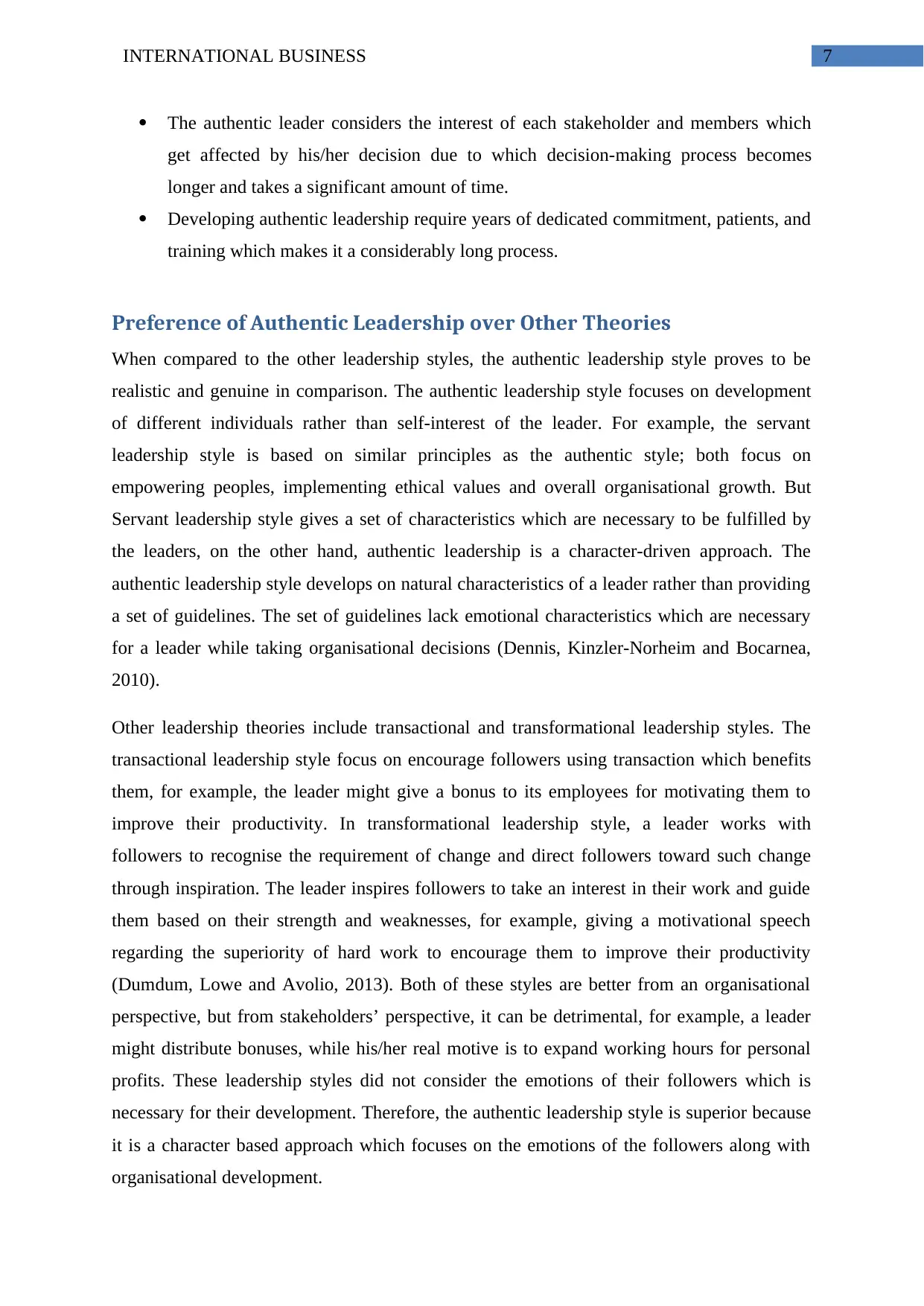
7INTERNATIONAL BUSINESS
The authentic leader considers the interest of each stakeholder and members which
get affected by his/her decision due to which decision-making process becomes
longer and takes a significant amount of time.
Developing authentic leadership require years of dedicated commitment, patients, and
training which makes it a considerably long process.
Preference of Authentic Leadership over Other Theories
When compared to the other leadership styles, the authentic leadership style proves to be
realistic and genuine in comparison. The authentic leadership style focuses on development
of different individuals rather than self-interest of the leader. For example, the servant
leadership style is based on similar principles as the authentic style; both focus on
empowering peoples, implementing ethical values and overall organisational growth. But
Servant leadership style gives a set of characteristics which are necessary to be fulfilled by
the leaders, on the other hand, authentic leadership is a character-driven approach. The
authentic leadership style develops on natural characteristics of a leader rather than providing
a set of guidelines. The set of guidelines lack emotional characteristics which are necessary
for a leader while taking organisational decisions (Dennis, Kinzler-Norheim and Bocarnea,
2010).
Other leadership theories include transactional and transformational leadership styles. The
transactional leadership style focus on encourage followers using transaction which benefits
them, for example, the leader might give a bonus to its employees for motivating them to
improve their productivity. In transformational leadership style, a leader works with
followers to recognise the requirement of change and direct followers toward such change
through inspiration. The leader inspires followers to take an interest in their work and guide
them based on their strength and weaknesses, for example, giving a motivational speech
regarding the superiority of hard work to encourage them to improve their productivity
(Dumdum, Lowe and Avolio, 2013). Both of these styles are better from an organisational
perspective, but from stakeholders’ perspective, it can be detrimental, for example, a leader
might distribute bonuses, while his/her real motive is to expand working hours for personal
profits. These leadership styles did not consider the emotions of their followers which is
necessary for their development. Therefore, the authentic leadership style is superior because
it is a character based approach which focuses on the emotions of the followers along with
organisational development.
The authentic leader considers the interest of each stakeholder and members which
get affected by his/her decision due to which decision-making process becomes
longer and takes a significant amount of time.
Developing authentic leadership require years of dedicated commitment, patients, and
training which makes it a considerably long process.
Preference of Authentic Leadership over Other Theories
When compared to the other leadership styles, the authentic leadership style proves to be
realistic and genuine in comparison. The authentic leadership style focuses on development
of different individuals rather than self-interest of the leader. For example, the servant
leadership style is based on similar principles as the authentic style; both focus on
empowering peoples, implementing ethical values and overall organisational growth. But
Servant leadership style gives a set of characteristics which are necessary to be fulfilled by
the leaders, on the other hand, authentic leadership is a character-driven approach. The
authentic leadership style develops on natural characteristics of a leader rather than providing
a set of guidelines. The set of guidelines lack emotional characteristics which are necessary
for a leader while taking organisational decisions (Dennis, Kinzler-Norheim and Bocarnea,
2010).
Other leadership theories include transactional and transformational leadership styles. The
transactional leadership style focus on encourage followers using transaction which benefits
them, for example, the leader might give a bonus to its employees for motivating them to
improve their productivity. In transformational leadership style, a leader works with
followers to recognise the requirement of change and direct followers toward such change
through inspiration. The leader inspires followers to take an interest in their work and guide
them based on their strength and weaknesses, for example, giving a motivational speech
regarding the superiority of hard work to encourage them to improve their productivity
(Dumdum, Lowe and Avolio, 2013). Both of these styles are better from an organisational
perspective, but from stakeholders’ perspective, it can be detrimental, for example, a leader
might distribute bonuses, while his/her real motive is to expand working hours for personal
profits. These leadership styles did not consider the emotions of their followers which is
necessary for their development. Therefore, the authentic leadership style is superior because
it is a character based approach which focuses on the emotions of the followers along with
organisational development.
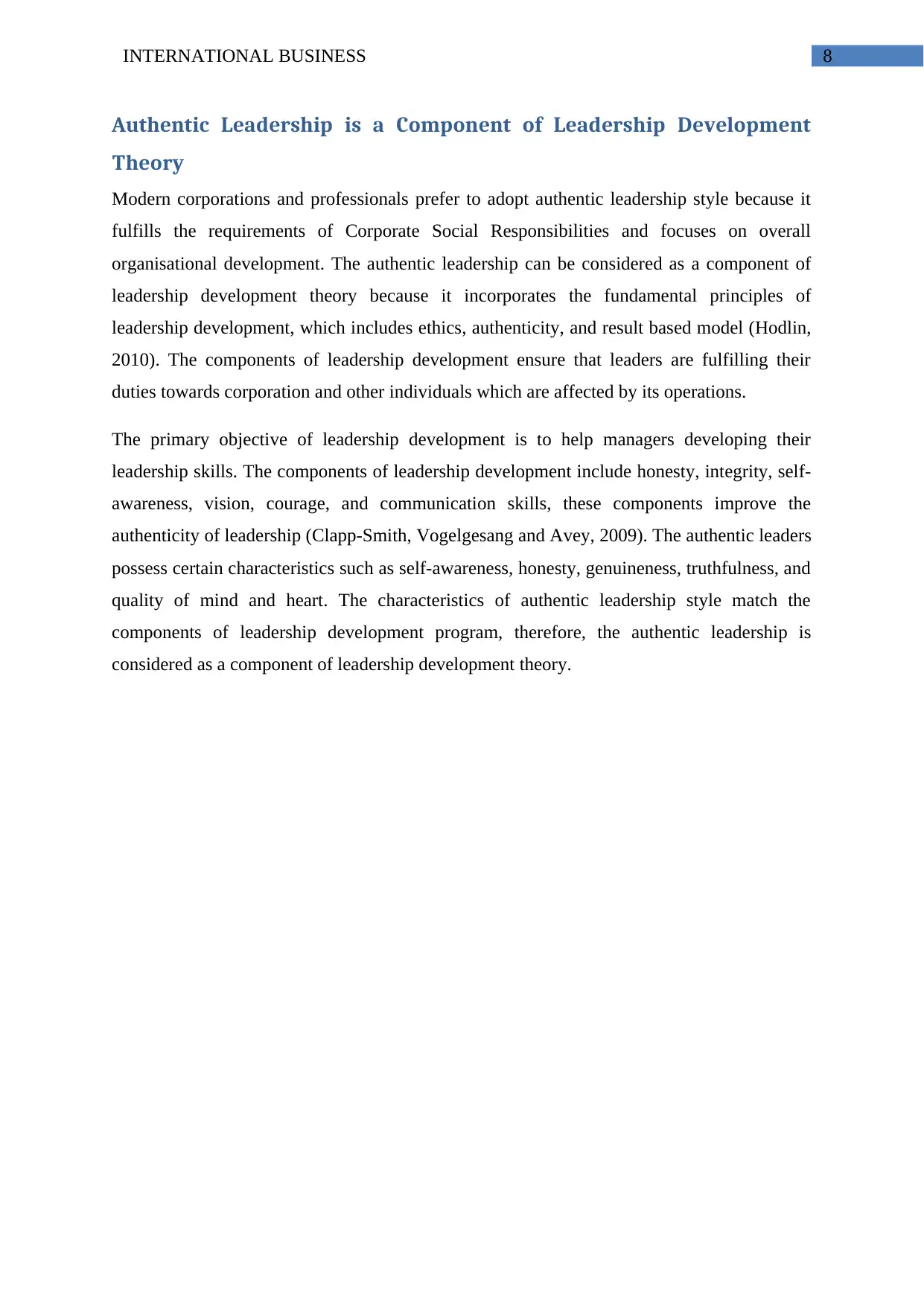
8INTERNATIONAL BUSINESS
Authentic Leadership is a Component of Leadership Development
Theory
Modern corporations and professionals prefer to adopt authentic leadership style because it
fulfills the requirements of Corporate Social Responsibilities and focuses on overall
organisational development. The authentic leadership can be considered as a component of
leadership development theory because it incorporates the fundamental principles of
leadership development, which includes ethics, authenticity, and result based model (Hodlin,
2010). The components of leadership development ensure that leaders are fulfilling their
duties towards corporation and other individuals which are affected by its operations.
The primary objective of leadership development is to help managers developing their
leadership skills. The components of leadership development include honesty, integrity, self-
awareness, vision, courage, and communication skills, these components improve the
authenticity of leadership (Clapp-Smith, Vogelgesang and Avey, 2009). The authentic leaders
possess certain characteristics such as self-awareness, honesty, genuineness, truthfulness, and
quality of mind and heart. The characteristics of authentic leadership style match the
components of leadership development program, therefore, the authentic leadership is
considered as a component of leadership development theory.
Authentic Leadership is a Component of Leadership Development
Theory
Modern corporations and professionals prefer to adopt authentic leadership style because it
fulfills the requirements of Corporate Social Responsibilities and focuses on overall
organisational development. The authentic leadership can be considered as a component of
leadership development theory because it incorporates the fundamental principles of
leadership development, which includes ethics, authenticity, and result based model (Hodlin,
2010). The components of leadership development ensure that leaders are fulfilling their
duties towards corporation and other individuals which are affected by its operations.
The primary objective of leadership development is to help managers developing their
leadership skills. The components of leadership development include honesty, integrity, self-
awareness, vision, courage, and communication skills, these components improve the
authenticity of leadership (Clapp-Smith, Vogelgesang and Avey, 2009). The authentic leaders
possess certain characteristics such as self-awareness, honesty, genuineness, truthfulness, and
quality of mind and heart. The characteristics of authentic leadership style match the
components of leadership development program, therefore, the authentic leadership is
considered as a component of leadership development theory.
⊘ This is a preview!⊘
Do you want full access?
Subscribe today to unlock all pages.

Trusted by 1+ million students worldwide
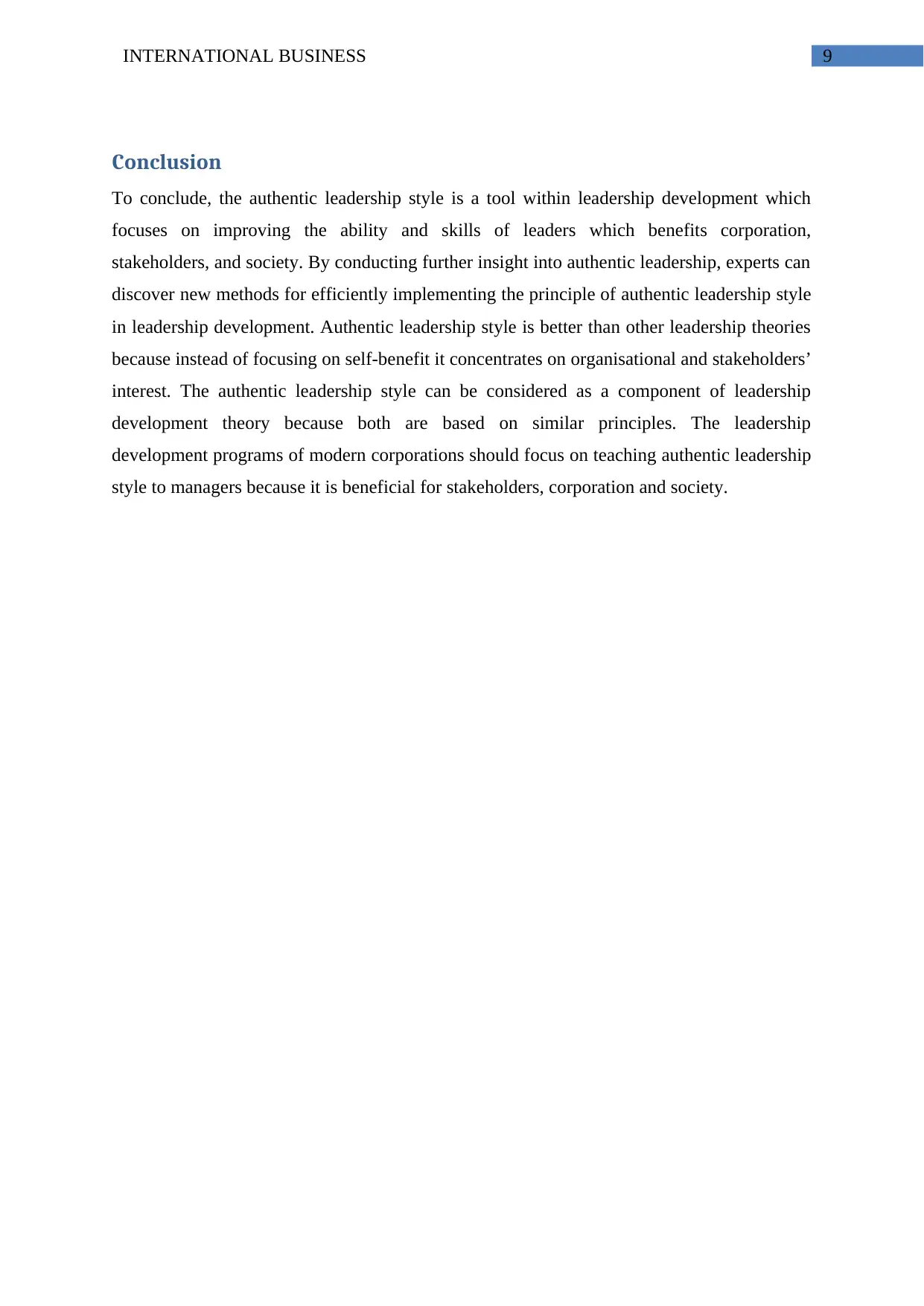
9INTERNATIONAL BUSINESS
Conclusion
To conclude, the authentic leadership style is a tool within leadership development which
focuses on improving the ability and skills of leaders which benefits corporation,
stakeholders, and society. By conducting further insight into authentic leadership, experts can
discover new methods for efficiently implementing the principle of authentic leadership style
in leadership development. Authentic leadership style is better than other leadership theories
because instead of focusing on self-benefit it concentrates on organisational and stakeholders’
interest. The authentic leadership style can be considered as a component of leadership
development theory because both are based on similar principles. The leadership
development programs of modern corporations should focus on teaching authentic leadership
style to managers because it is beneficial for stakeholders, corporation and society.
Conclusion
To conclude, the authentic leadership style is a tool within leadership development which
focuses on improving the ability and skills of leaders which benefits corporation,
stakeholders, and society. By conducting further insight into authentic leadership, experts can
discover new methods for efficiently implementing the principle of authentic leadership style
in leadership development. Authentic leadership style is better than other leadership theories
because instead of focusing on self-benefit it concentrates on organisational and stakeholders’
interest. The authentic leadership style can be considered as a component of leadership
development theory because both are based on similar principles. The leadership
development programs of modern corporations should focus on teaching authentic leadership
style to managers because it is beneficial for stakeholders, corporation and society.
Paraphrase This Document
Need a fresh take? Get an instant paraphrase of this document with our AI Paraphraser
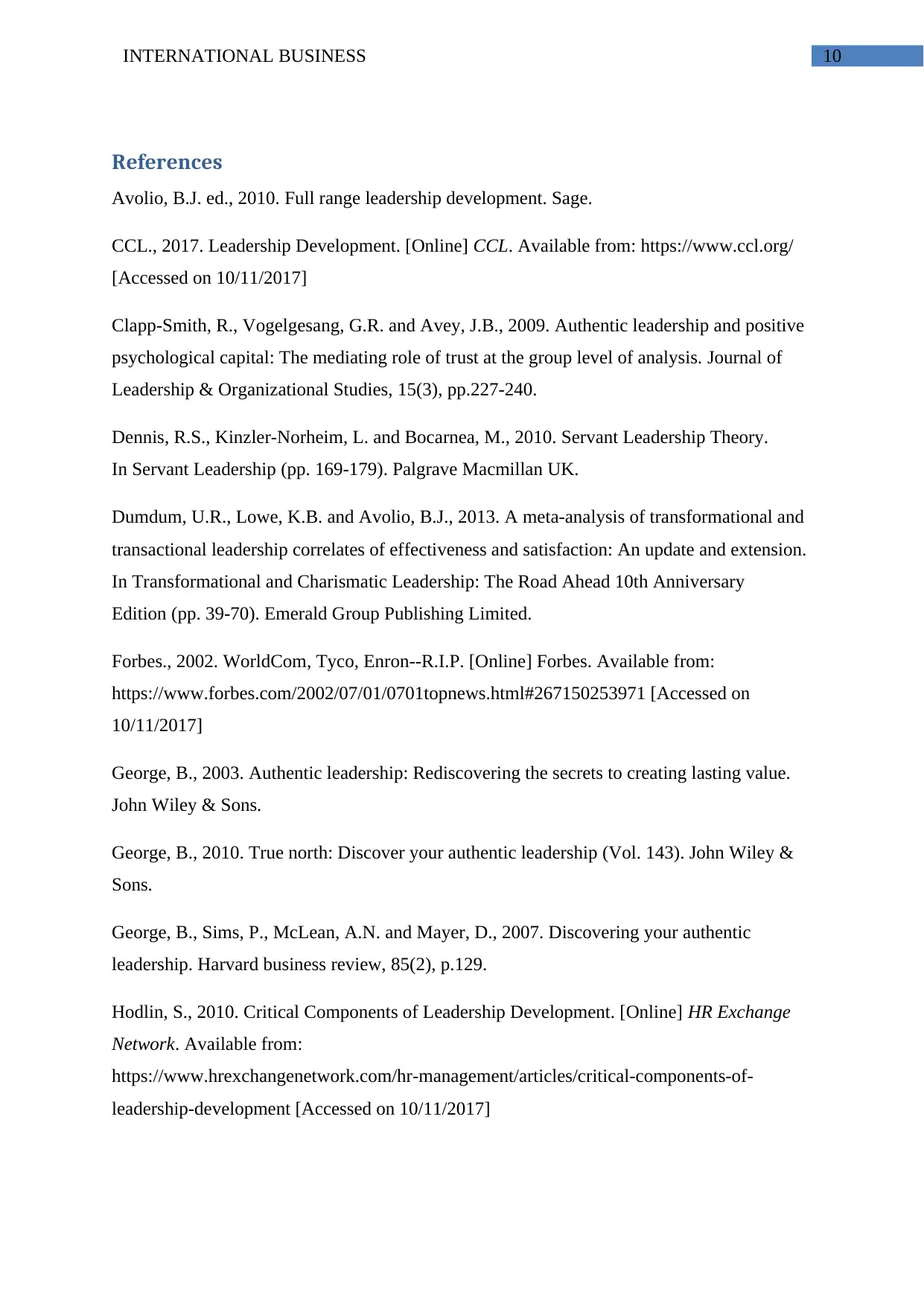
10INTERNATIONAL BUSINESS
References
Avolio, B.J. ed., 2010. Full range leadership development. Sage.
CCL., 2017. Leadership Development. [Online] CCL. Available from: https://www.ccl.org/
[Accessed on 10/11/2017]
Clapp-Smith, R., Vogelgesang, G.R. and Avey, J.B., 2009. Authentic leadership and positive
psychological capital: The mediating role of trust at the group level of analysis. Journal of
Leadership & Organizational Studies, 15(3), pp.227-240.
Dennis, R.S., Kinzler-Norheim, L. and Bocarnea, M., 2010. Servant Leadership Theory.
In Servant Leadership (pp. 169-179). Palgrave Macmillan UK.
Dumdum, U.R., Lowe, K.B. and Avolio, B.J., 2013. A meta-analysis of transformational and
transactional leadership correlates of effectiveness and satisfaction: An update and extension.
In Transformational and Charismatic Leadership: The Road Ahead 10th Anniversary
Edition (pp. 39-70). Emerald Group Publishing Limited.
Forbes., 2002. WorldCom, Tyco, Enron--R.I.P. [Online] Forbes. Available from:
https://www.forbes.com/2002/07/01/0701topnews.html#267150253971 [Accessed on
10/11/2017]
George, B., 2003. Authentic leadership: Rediscovering the secrets to creating lasting value.
John Wiley & Sons.
George, B., 2010. True north: Discover your authentic leadership (Vol. 143). John Wiley &
Sons.
George, B., Sims, P., McLean, A.N. and Mayer, D., 2007. Discovering your authentic
leadership. Harvard business review, 85(2), p.129.
Hodlin, S., 2010. Critical Components of Leadership Development. [Online] HR Exchange
Network. Available from:
https://www.hrexchangenetwork.com/hr-management/articles/critical-components-of-
leadership-development [Accessed on 10/11/2017]
References
Avolio, B.J. ed., 2010. Full range leadership development. Sage.
CCL., 2017. Leadership Development. [Online] CCL. Available from: https://www.ccl.org/
[Accessed on 10/11/2017]
Clapp-Smith, R., Vogelgesang, G.R. and Avey, J.B., 2009. Authentic leadership and positive
psychological capital: The mediating role of trust at the group level of analysis. Journal of
Leadership & Organizational Studies, 15(3), pp.227-240.
Dennis, R.S., Kinzler-Norheim, L. and Bocarnea, M., 2010. Servant Leadership Theory.
In Servant Leadership (pp. 169-179). Palgrave Macmillan UK.
Dumdum, U.R., Lowe, K.B. and Avolio, B.J., 2013. A meta-analysis of transformational and
transactional leadership correlates of effectiveness and satisfaction: An update and extension.
In Transformational and Charismatic Leadership: The Road Ahead 10th Anniversary
Edition (pp. 39-70). Emerald Group Publishing Limited.
Forbes., 2002. WorldCom, Tyco, Enron--R.I.P. [Online] Forbes. Available from:
https://www.forbes.com/2002/07/01/0701topnews.html#267150253971 [Accessed on
10/11/2017]
George, B., 2003. Authentic leadership: Rediscovering the secrets to creating lasting value.
John Wiley & Sons.
George, B., 2010. True north: Discover your authentic leadership (Vol. 143). John Wiley &
Sons.
George, B., Sims, P., McLean, A.N. and Mayer, D., 2007. Discovering your authentic
leadership. Harvard business review, 85(2), p.129.
Hodlin, S., 2010. Critical Components of Leadership Development. [Online] HR Exchange
Network. Available from:
https://www.hrexchangenetwork.com/hr-management/articles/critical-components-of-
leadership-development [Accessed on 10/11/2017]
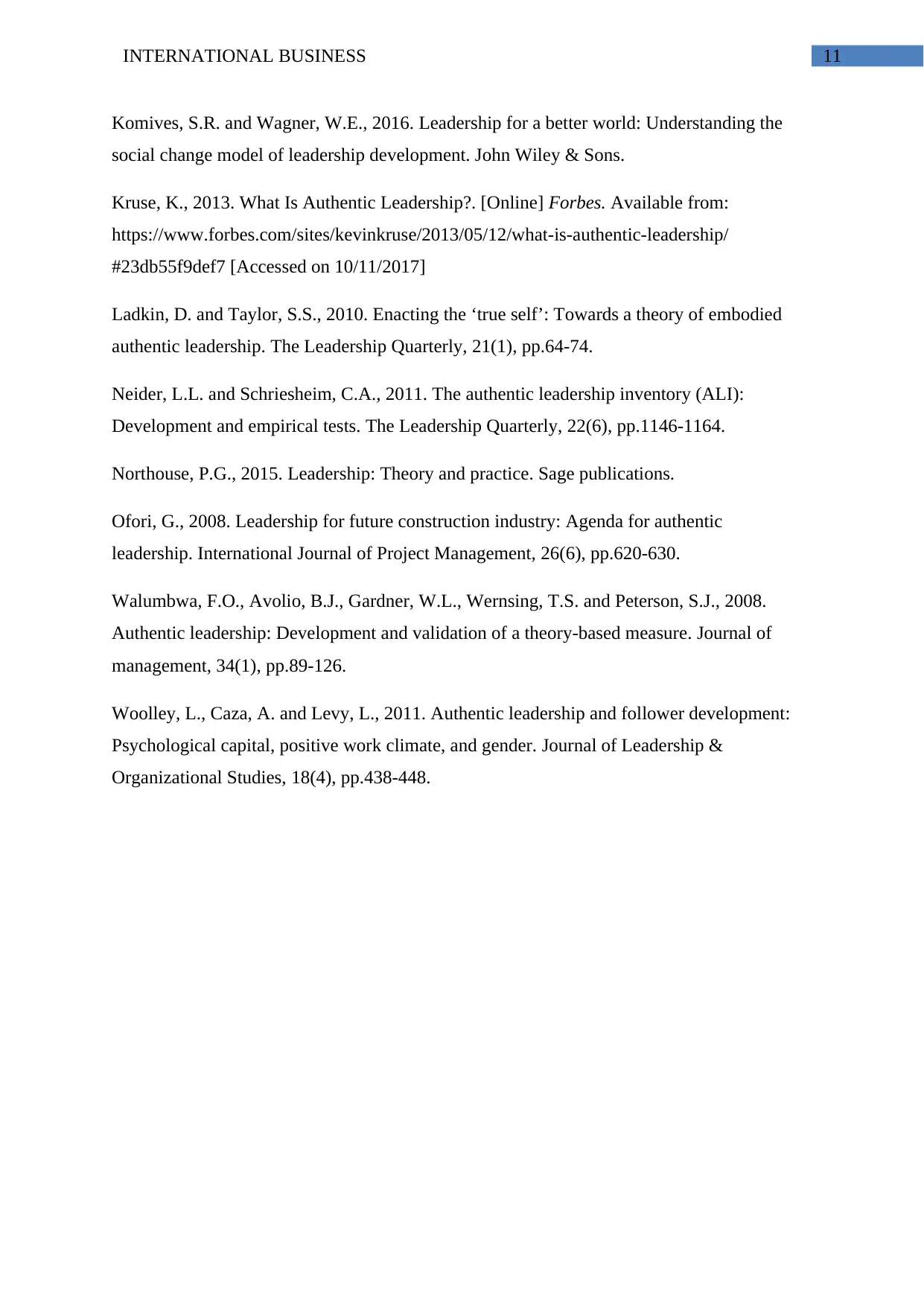
11INTERNATIONAL BUSINESS
Komives, S.R. and Wagner, W.E., 2016. Leadership for a better world: Understanding the
social change model of leadership development. John Wiley & Sons.
Kruse, K., 2013. What Is Authentic Leadership?. [Online] Forbes. Available from:
https://www.forbes.com/sites/kevinkruse/2013/05/12/what-is-authentic-leadership/
#23db55f9def7 [Accessed on 10/11/2017]
Ladkin, D. and Taylor, S.S., 2010. Enacting the ‘true self’: Towards a theory of embodied
authentic leadership. The Leadership Quarterly, 21(1), pp.64-74.
Neider, L.L. and Schriesheim, C.A., 2011. The authentic leadership inventory (ALI):
Development and empirical tests. The Leadership Quarterly, 22(6), pp.1146-1164.
Northouse, P.G., 2015. Leadership: Theory and practice. Sage publications.
Ofori, G., 2008. Leadership for future construction industry: Agenda for authentic
leadership. International Journal of Project Management, 26(6), pp.620-630.
Walumbwa, F.O., Avolio, B.J., Gardner, W.L., Wernsing, T.S. and Peterson, S.J., 2008.
Authentic leadership: Development and validation of a theory-based measure. Journal of
management, 34(1), pp.89-126.
Woolley, L., Caza, A. and Levy, L., 2011. Authentic leadership and follower development:
Psychological capital, positive work climate, and gender. Journal of Leadership &
Organizational Studies, 18(4), pp.438-448.
Komives, S.R. and Wagner, W.E., 2016. Leadership for a better world: Understanding the
social change model of leadership development. John Wiley & Sons.
Kruse, K., 2013. What Is Authentic Leadership?. [Online] Forbes. Available from:
https://www.forbes.com/sites/kevinkruse/2013/05/12/what-is-authentic-leadership/
#23db55f9def7 [Accessed on 10/11/2017]
Ladkin, D. and Taylor, S.S., 2010. Enacting the ‘true self’: Towards a theory of embodied
authentic leadership. The Leadership Quarterly, 21(1), pp.64-74.
Neider, L.L. and Schriesheim, C.A., 2011. The authentic leadership inventory (ALI):
Development and empirical tests. The Leadership Quarterly, 22(6), pp.1146-1164.
Northouse, P.G., 2015. Leadership: Theory and practice. Sage publications.
Ofori, G., 2008. Leadership for future construction industry: Agenda for authentic
leadership. International Journal of Project Management, 26(6), pp.620-630.
Walumbwa, F.O., Avolio, B.J., Gardner, W.L., Wernsing, T.S. and Peterson, S.J., 2008.
Authentic leadership: Development and validation of a theory-based measure. Journal of
management, 34(1), pp.89-126.
Woolley, L., Caza, A. and Levy, L., 2011. Authentic leadership and follower development:
Psychological capital, positive work climate, and gender. Journal of Leadership &
Organizational Studies, 18(4), pp.438-448.
⊘ This is a preview!⊘
Do you want full access?
Subscribe today to unlock all pages.

Trusted by 1+ million students worldwide
1 out of 12
Related Documents
Your All-in-One AI-Powered Toolkit for Academic Success.
+13062052269
info@desklib.com
Available 24*7 on WhatsApp / Email
![[object Object]](/_next/static/media/star-bottom.7253800d.svg)
Unlock your academic potential
Copyright © 2020–2026 A2Z Services. All Rights Reserved. Developed and managed by ZUCOL.




